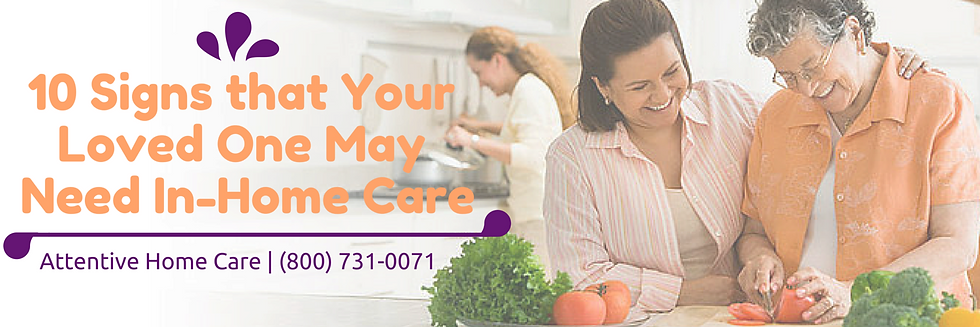When is the Right Time for In-Home Care?
- Attentive Home Care
- Feb 1, 2016
- 3 min read

It's often hard for seniors living on their own to admit that their daily tasks and activities are becoming difficult to handle on their own. Seniors tend to hesitate to ask for help, fearing that they will be placed in a nursing home and that their independence will be compromised. They may struggle to confide in their children and ask for assistance because they know an overreaction is bound to occur.
If your loved one ever shows these signs of needing extra help, your first step should be to explore in-home care. Moving seniors from the comfort of their home to an unfamiliar setting can be traumatizing and potentially damaging for them. So instead of not knowing what to do, rest assured knowing that Attentive Home Care caregivers are ready to help your mother, father, grandmother or granddaughter to age safely and comfortably in place.
But first, how can you determine if a senior needs in-home care, but is simply unwilling or afraid to ask for help?
Here are 10 common signs that an elderly person may need in-home care:
Observe the senior's appearance:
1. Look for unexplained bruises as bruising can be a sign of difficulty balancing and walking, leading to impaired coordination and falls.
2. Evaluate the senior's ability to rise from a sitting position -- does it appear easy or difficult? This indicates leg strength and balance. If a patient struggles to get up from their seat, then they may need a helping hand for activities like exiting the bathroom to prevent potential falls or accidents.
3. Do you notice any weight loss? This signifies a poor diet. Weight loss could also be a sign of depression, forgetfulness or even dementia that would account for skipping meals or eating less.
4. Personal hygiene becomes increasingly difficult to maintain with age and is a clear way to evaluate your loved one. Do they appear as clean as you once remembered them? If an unpleasant odor emanates from an older person it could be due to lack of bathing, whether because of a lack of capability or forgetfulness. Your loved one may be embarrassed to admit they need help bathing, so be cautious of what you say to the sensitive subject matter.
5. Now check the condition of their home. Look inside the fridge to see if there is an excessive amount of spoiled food. Is the house unusually messy? Do the mail, bills and newspapers pile up on the table unaccounted for? If there aren't sure signs in the senior's physical appearance, be sure to assess the surroundings. Sometimes older people can come off as functional, but might actually need extra care.
As seniors age, they often become isolated. They may not be able to get out and socialize as often as they used to, which commonly leads to depression. Family members are usually too busy to help. Attentive Home caregivers help mobilize your loved ones, taking them outside on walks and to the store and serve as companions.
Pay attention for any unusual behavior. The following are symptoms of depression:
6. Lack of interest in hobbies
7. Sudden mood swings
8. Missing important appointments (either due to disinterest or forgetfulness)
9. Exhibiting apathy toward responsibilities (such as paying bills; also a sign of Alzheimer's disease)
10. Forgetfulness or confusion with once-familiar, daily tasks, people or places (especially if it occurs on multiple occasions)
When confronting an elderly loved one about their need of assistance in the home, they may deny it. "I'm fine on my own," they might say, or "Don't you think I'm capable?" It can be a difficult process to convince them they need care for someone who is not looking for it, but being patient is key. Continue talking about it and ease the senior in to receiving all of the care that they need and deserve for their health and happiness.




















